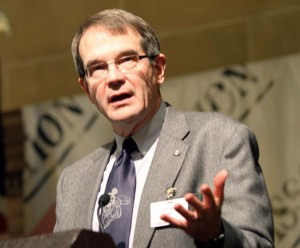
UAW President Bob King has secured a vote at VW's Chattanooga, Tenn. plant to establish a works council.
In a potentially groundbreaking development that could determine the long-term viability of the United Auto Workers Union, workers at the Volkswagen plant in Chattanooga, Tenn. will vote this month on whether to let the union represent them.
Virtually every major “import” now operates at least one U.S. assembly plant – some today producing the vast majority of the vehicles they sell in this country at these “transplant” factories. So far, the UAW has failed to gain a foothold as makers like Toyota, Honda, Nissan and Mercedes-Benz have actively resisted organizing drives.
That has led to a sharp decline in the union’s membership and severely weakened its financial base, leading some analysts to warn that unless the UAW can crack into some of the transplants its future could be in danger.
“Volkswagen is known globally for its system of cooperation with unions and works councils,” said UAW President Bob King. “The UAW seeks to partner with VWGOA and a works council to set a new standard in the U.S. for innovative labor-management relations that benefits the company, the entire workforce, shareholders and the community. The historic success of the works council model is in line with the UAW’s successful partnerships with the domestic automakers and its vision of the 21st century union.”
That change may begin when Volkswagen workers at the Chattanooga facility will vote in an election conducted by the National Labor Relations Board on Feb. 12 – 14 to determine if the UAW can move forward with a new collaborative approach with VWGOA based on the principles of co-determination that would include the formation of a works council at its Chattanooga facility.
This would be the first works council established in the United States, the UAW said in a statement. The NLRB set the election as a result of an agreement reached between Volkswagen Group of America and the United Autoworkers
It is the first time the UAW has called for an election at a non-union plant in Southern United States since the effort at a Nissan plant in Smyrna, Tenn., ended in defeat in September 2001. The announcement of the vote comes after a year-long campaign on both sides of the Atlantic in which the UAW enlisted the support from the German Metal Workers union and the labor representatives on the VW Board of Supervisors.
(Bad weather puts freeze on January sales. For more, Click Here.)
The combined weight of the German Metalworkers union and the Board of Supervisors union effectively neutralized the opposition to the union within the management ranks of Volkswagen of America. The alliance with the German unions allowed the UAW to campaign among the VW without the countervailing pressure that has been common in other UAW organizing drives in the South.
King said a majority of the Chattanooga workers have already signed cards asking for UAW representation.
(Click Here to see Volkswagen lay claim to second place in global sales.)
Chattanooga is the only major VWGOA assembly facility without labor representation. With a works council, the Chattanooga plant would have a seat on the VW Global Group Works Council. Ultimately, such a labor relations model would give workers an integral role in co-managing the company and providing input on workplace improvements that would contribute to the success of the company and the workers.
“With a local works council, workers would have a voice they can use to make Volkswagen stronger; in safety, job security and efficiency,” said Jonathan Walden, Volkswagen paint technician. “Global representation means Chattanooga workers may have a strong voice in seeking new products and bringing more jobs to Tennessee.”
(To see how VW celebrated 65 years of Beetles in the U.S., Click Here.)
Co-determination is a key factor in Volkswagen’s success. Volkswagen has extensive experience with union representation and is globally recognized as being in the forefront of respecting the basic human rights of workers to organize and collectively bargain. Volkswagen’s Global Charter on Labor Relations and Social Charter go beyond international labor standards, establishing principles governing labor relations and social matters, even establishing principles on issues like the use of temporary workers.
“We have reached an agreement with VWGOA that will allow workers to express their opinion and decide on the question of union representation in an atmosphere of mutual respect and cooperation,” said UAW Region 8 Director Gary Casteel, who directs the union’s Southern organizing. “The UAW commends the company and the Global Works Council for recognizing global human rights and worker rights in Tennessee.”
